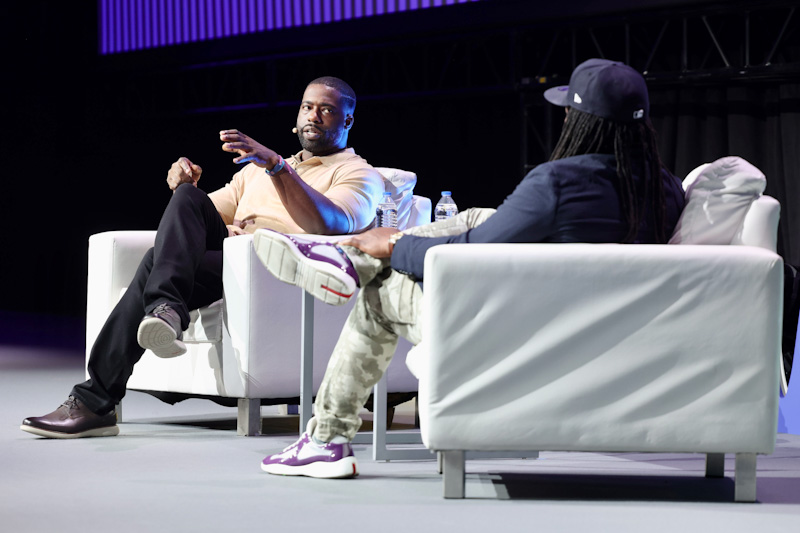Wrongfully convicted man urges criminal justice reform at final day of Clio Cloud Conference

Brian Banks (left), who was wrongully convicted of rape and wrote a book about his experiences, speaks with writer Shaka Senghor at the 2023 Clio Cloud Conference on Oct. 10. Photo courtesy of Clio.
More than 20 years ago, Brian Banks was wrongfully convicted of rape, delaying his dream of becoming a professional football player. At his keynote address at the Clio Cloud Conference on Tuesday morning, Banks urged the audience of lawyers and legal professionals to embrace reforms to create a fairer and more just system for people entangled in the criminal justice system.
“I implore each one of you to reflect on your role in shaping the future of our legal system,” Banks told the audience at the Gaylord Opryland Resort & Convention Center in Nashville, Tennessee. “Together, we can be the architects of a legal system that stands as the testament to a shared collective, where justice is not a distant memory or idea but an actual reality.”
After serving five years in prison, Banks was finally able to prove his innocence in 2012, when the woman who accused him of the rape, Wanetta Gibson, recanted her statements and admitted that she had lied after reconnecting with Banks on Facebook and meeting him at his private investigator’s office.
Banks wrote a book about his experiences, What Set Me Free: A True Story of Wrongful Conviction, a Dream Deferred, and a Man Redeemed. A movie titled Brian Banks, starring Aldis Hodge and Greg Kinnear, was released in 2018.
In his keynote, Banks urged his audience to push for reform by expanding access to justice with technological innovation, remote access and pro bono initiatives, and he said legal professionals should embrace changes to “simplify procedures, expedite cases and restore “faith in the system.”
Banks suggested that the legal system had to do more than pay lip service to diversity and inclusion, calling it “not just a buzzword” but essential for a “more comprehensive understanding of justice.” And he highlighted the outsized role of plea deals.
According to the California Innocence Project, Los Angeles Superior Court Judge Mark C. Kim reversed Banks’ conviction in May 2012. By that time, Banks had served more than five years in prison after he had taken a plea deal with prosecutors at age 17 to avoid a potential prison sentence of 41 years to life in prison.
“There is a failed plea bargaining system, a system that forces individuals into making choices that may not serve justice at all,” Banks said. “It often results in the individuals accepting plea deals to avoid staggering consequences of a trial, even when they believe in their innocence. This is not justice.”
After his keynote address, Banks was interviewed onstage by author Shaka Senghor, who wrote a memoir, Writing My Wrongs: Life, Death, and Redemption in an American Prison.
Banks told Senghor how football and dreams of playing in the NFL had shaped his time at school. Before he was falsely accused of rape at age 16, he was on the path to a football career after the University of Southern California sent him his first recruitment letter while he was at the end of his sophomore year in high school, he said.
After he was exonerated, Banks later signed for the Atlanta Falcons in 2013, playing four games, before he was released in August 2013, according to the California Innocence Project.
Banks said he was arrested July 8, 2000, at age 16. He described a harrowing time in a Los Angeles juvenile detention center, when he lost 14 pounds and required medical attention.
He credits a teacher at the center, Jerome Johnson, with helping him get through the experience.
According to Banks, Johnson had Banks read literature and study spirituality, enlightenment and Afrocentricity, which gave him “all these different tools and techniques no one had ever presented to me before.”
Banks said he thought that Johnson was preparing him for life when he returned home. But he later realized that the teacher was getting him ready for life in prison.
“He knew what the system was about, and he knew how the system can chew you up and spit you out and not think twice about it,” Banks said. “If it wasn’t for that champion in my life … I don’t know how I would have got through it.”



